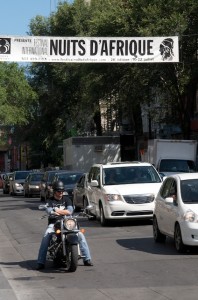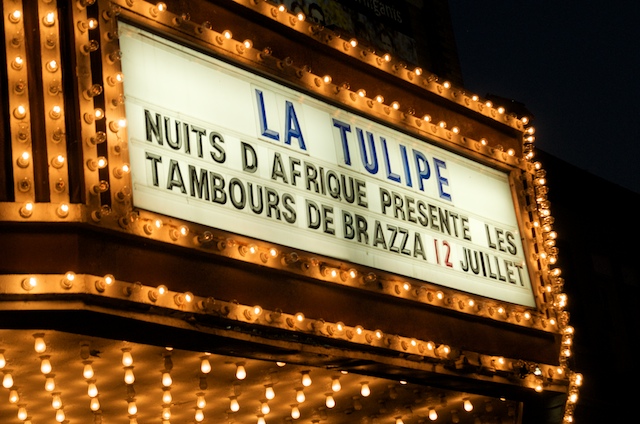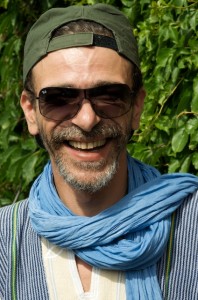Blog July 17, 2012
Nuits D'Afriques: 26 Years of Afro-bliss in Montreal
It's summer in Montreal and once again African music is in the air. Twenty-six years ago, a young nightclub owner from Guinea--Lamine Touré--and a small team of African music enthusiasts mounted the first Nuits d'Afrique festival on a single stage, set up on Saint Laurent Street, out in front of Toure's club, Balatou. In 2012, the festival is staging 91 shows over 2 weeks, using 7 indoor venues, and culminating in 4 days of free outdoor concerts (July 19-22) in a virtual African village constructed in downtown Montreal. Nuits D'Afrique has a reputation as one of the world's best African music festivals--an amalgam of the best in pan-African talent, and also an expression of a truly cosmopolitan city that is now home to an impressive cast of international musicians, and some of the most enthusiastic audiences you will find anywhere.
 Afropop made a long-overdue pilgrimage to this historic festival catching this year's early shows, and I am happy to report that Nuits d'Afrique lives up to its billing. The musical curation was consistently excellent. The venues were comfortable with good sight-lines and superb sound every time. And the ambiance of this singularly international city--like a de-stressed New York--completed the experience with an easy flow of culture and languge. Afropop gathered material for a number of future broadcasts--on Algeria, Zimbabwe and Afro-Montreal. The only hard part was leaving early, "without completing the race," as Lamine Touré playfully scolded me. But it might not be too late for you. As I write, the festival has a great week to go. Here's a report on Afropop's Montreal experience. Click here for full details on the 26th Festival International Nuits d'Afrique.
Afropop made a long-overdue pilgrimage to this historic festival catching this year's early shows, and I am happy to report that Nuits d'Afrique lives up to its billing. The musical curation was consistently excellent. The venues were comfortable with good sight-lines and superb sound every time. And the ambiance of this singularly international city--like a de-stressed New York--completed the experience with an easy flow of culture and languge. Afropop gathered material for a number of future broadcasts--on Algeria, Zimbabwe and Afro-Montreal. The only hard part was leaving early, "without completing the race," as Lamine Touré playfully scolded me. But it might not be too late for you. As I write, the festival has a great week to go. Here's a report on Afropop's Montreal experience. Click here for full details on the 26th Festival International Nuits d'Afrique.
 Afropop made a long-overdue pilgrimage to this historic festival catching this year's early shows, and I am happy to report that Nuits d'Afrique lives up to its billing. The musical curation was consistently excellent. The venues were comfortable with good sight-lines and superb sound every time. And the ambiance of this singularly international city--like a de-stressed New York--completed the experience with an easy flow of culture and languge. Afropop gathered material for a number of future broadcasts--on Algeria, Zimbabwe and Afro-Montreal. The only hard part was leaving early, "without completing the race," as Lamine Touré playfully scolded me. But it might not be too late for you. As I write, the festival has a great week to go. Here's a report on Afropop's Montreal experience. Click here for full details on the 26th Festival International Nuits d'Afrique.
Afropop made a long-overdue pilgrimage to this historic festival catching this year's early shows, and I am happy to report that Nuits d'Afrique lives up to its billing. The musical curation was consistently excellent. The venues were comfortable with good sight-lines and superb sound every time. And the ambiance of this singularly international city--like a de-stressed New York--completed the experience with an easy flow of culture and languge. Afropop gathered material for a number of future broadcasts--on Algeria, Zimbabwe and Afro-Montreal. The only hard part was leaving early, "without completing the race," as Lamine Touré playfully scolded me. But it might not be too late for you. As I write, the festival has a great week to go. Here's a report on Afropop's Montreal experience. Click here for full details on the 26th Festival International Nuits d'Afrique.










